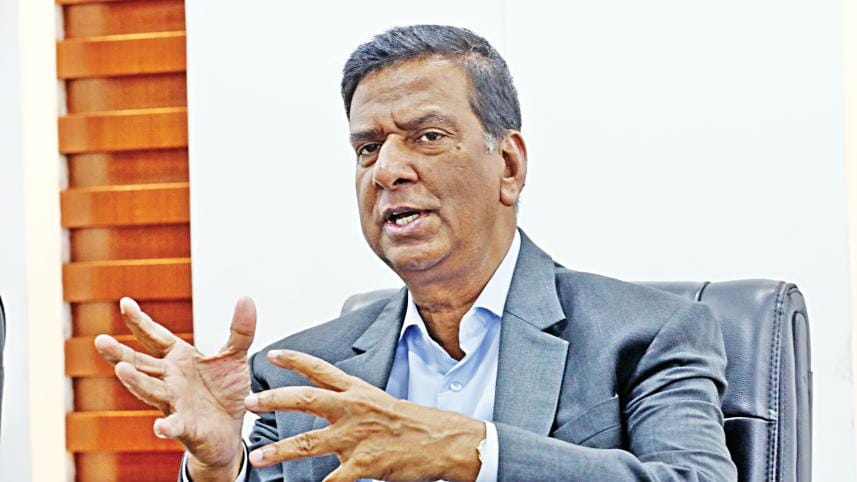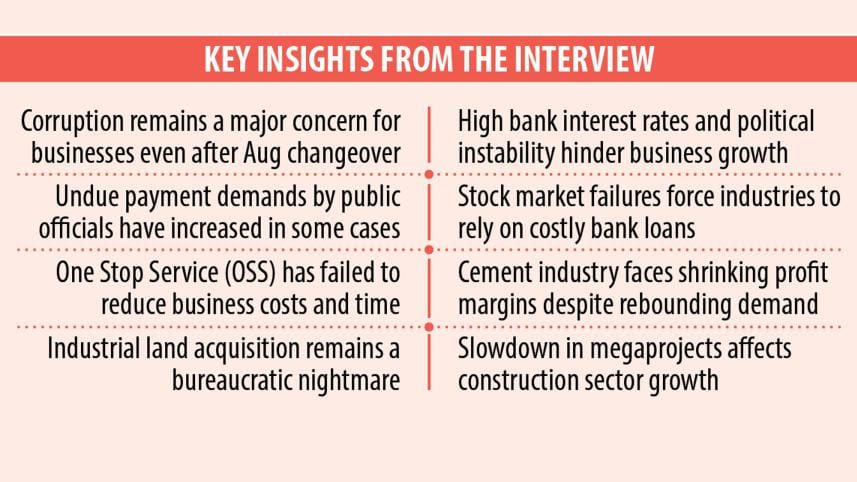Corruption still unbridled for businesses

Although the interim government is focusing on reforms and new measures, corruption remains a major concern for businesses. Instead of waning, demands for undue payments by public officials have increased in some cases, said a top industrialist.
"We don't see any restraint," said Md Alamgir Kabir, vice-chairman of Crown Cement PLC, one of the leading cement manufacturers in the local market, in an interview with The Daily Star.

Recalling the period after an army-led caretaker government took power in January 2007, he said that at the time, many public officials were hesitant to seek bribes for providing services.
After the ousting of Sheikh Hasina's government in a mass uprising in early August, the interim government, led by Nobel laureate Muhammad Yunus, took charge, raising expectations of change on many fronts, including reducing corruption, which had become pervasive during Hasina's 15-year rule.
Kabir, also the president of the Bangladesh Cement Manufacturers Association (BCMA), said that while the government's investment promotion agencies boast of One-Stop Service (OSS), the initiative has yet to reduce costs and delays for businesses.
Firms still have to visit public offices for clearances and permits, often paying more than the officially determined fees to speed up services, said the businessman.
"We have to term these payments as miscellaneous costs in our balance sheets. And in many cases, these costs have not declined," he said.
"While law enforcement appears stricter on paper, many issues are not coming out."
Acquiring land for industrial purposes remains a bureaucratic nightmare, despite the promise of hassle-free services, Kabir said.
In the interview, the industrialist—whose company markets the construction raw material under the brand Crown Cement—also talked about the overall economic and business climate, the impact of high-interest rates on bank loans, and the current state of the cement industry.
He described the current business environment as "far from favourable," citing high borrowing costs and political uncertainty as key concerns.
"High bank interest rates and political instability make it nearly impossible for businesses to thrive."
In the past, Kabir said, businesses used to raise capital from the stock market to avoid bank borrowing at high-interest rates.
"But that option has shrunk," he said, adding that the capital market has failed to become a viable funding source due to poor management and governance.
"The capital market is now at its worst state, with a significant decline in public participation. As a result, industries are forced to rely on banks, which are profiting while industries struggle."
He pointed out that one bank made over Tk 2,200 crore in profit last year, whereas even after investing thousands of crores of taka, industries rarely get such high returns.
The president of the cement manufacturers' association said this situation might not have arisen if businesses had access to a vibrant alternative funding source.
Apart from high borrowing costs, he said that political instability is another major hurdle for local businesses.
"Businesses need a stable environment, but somehow this has not been the case."
"An elected, stable government is needed to remove uncertainty and bring stability," said the businessman.
Kabir also talked about tax policies, particularly in the cement sector. He said that manufacturers must pay a portion of their revenue in taxes even if they incur losses.
Besides, taxes paid on imported raw materials are not refunded, even when firms suffer losses.
"It shouldn't be," he said.
The entrepreneur, who has been in business for nearly four decades, said that tax policy formulation should be separate from tax administration.
Currently, the National Board of Revenue (NBR) frames tax policies based on revenue targets set by the government.
Kabir suggested that a separate department should formulate tax policies to ensure fairness. Instead of focusing on businesses that comply with tax regulations, he said, the government should address tax evasion more effectively.
He also criticised policy inconsistencies, pointing out that some industries, such as readymade garments, receive more support than others, like local manufacturers producing import substitutes such as cement.
Local industries save foreign currency, he said, yet they do not receive enough support to grow.
The leader of local cement makers said the country's cement production capacity is 92 lakh tonnes, while monthly consumption is only 37 lakh tonnes.
The utilisation rate is about 44–45 percent, and the industry has declined in recent years, he said.
However, there was a turnaround in January this year, when the sector recorded a historic high of 38 lakh tonnes in sales, driven mainly by private-sector demand.
Rural construction has increased, likely due to higher remittance inflows and changing housing trends, according to Kabir.
Despite this growth, cement factories are still grappling with reduced profit margins, he said, citing rising bank interest rates, electricity and gas costs, transportation expenses, and labour costs as major issues.
Production costs rose by 11–12 percent between 2023 and 2024. However, intense competition prevents companies from increasing prices, further squeezing their profits.
Despite these challenges, Kabir believes the industry still has substantial growth potential.
Per capita cement consumption in Bangladesh has increased from 52 kg in the 1990s to 225 kg now. However, the country still lags behind India (310 kg) and China (1,700 kg).
Government megaprojects have historically driven growth in the construction sector, encouraging investment, he said.
However, as the interim government slows down large public construction projects, only those funded by foreign agencies, such as Japan and China, remain active.
This provides some opportunities for the industry, while the private sector has begun playing a larger role in driving demand, according to Kabir.





 For all latest news, follow The Daily Star's Google News channel.
For all latest news, follow The Daily Star's Google News channel.
Comments